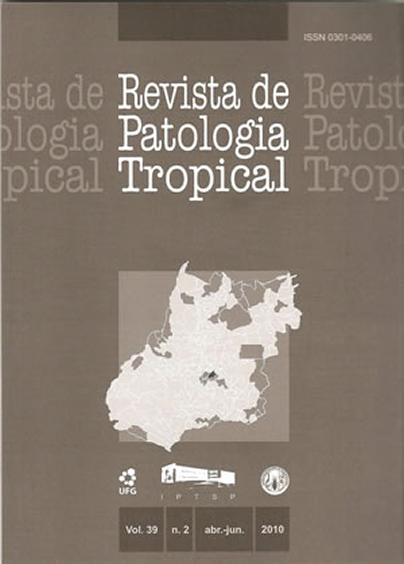Survey of Trichomonas vaginalis in women attended in public health care facilities and risk factors for infection, in Uberlândia, Minas Gerais state, Brazil.
DOI:
https://doi.org/10.5216/rpt.v39i2.10726Keywords:
Trichomonas vaginalis, Women, Prevalence, Risk factors.Abstract
Trichomonas vaginalis is the etiologic agent of trichomoniasis, recognized as oneof the most prevalent sexually transmitted infections, yet it is also one of the most
poorly investigated infections. The objective of this study was to determine the
prevalence of the parasite among women and to identify possible factors associated
to the infection. Samples from 157 women were collected and an epidemiological
inquiry was applied to evaluate the habits and behavior of the population. Two
distinct samples of each patient were collected and evaluated by culture, wet
mount test, and Papanicolaou test. From the total of patients, nine (5.7%) women,
with median age of 37 years old, from different ethnicities, and married, were infected with T. vaginalis. These data showed higher prevalence of the infection
among blacks, although the difference was not statistical significant (p> 0.05). In
addition, low education level, phase of the menstrual cycles and clinical signals
were variables associated to the infection (p <0.05). The comparison between the
diagnostic methods, wet mount test and culture showed 100% of concordance and
presented higher sensitivity than Papanicolaou test. These results contribute to
socioepidemiologic studies, the understanding of the involvement of the parasite,
and that the early diagnosis provides the opportunity to reduce transmission and
potentially prevent future complications.
Downloads
Downloads
Published
How to Cite
Issue
Section
License
The manuscript submission must be accompanied by a letter signed by all authors stating the full name and email address, confirming that the material has not been published or is under consideration for publication elsewhere, and agreeing to transfer copyright in all media and formats for Journal of Tropical Pathology. The authors will not be paid for published articles. They are solely responsible for the content of those articles, even if the Editor holds the right to adjust them to the norms of the journal.
The reviewers will not be paid for the peer review process.

